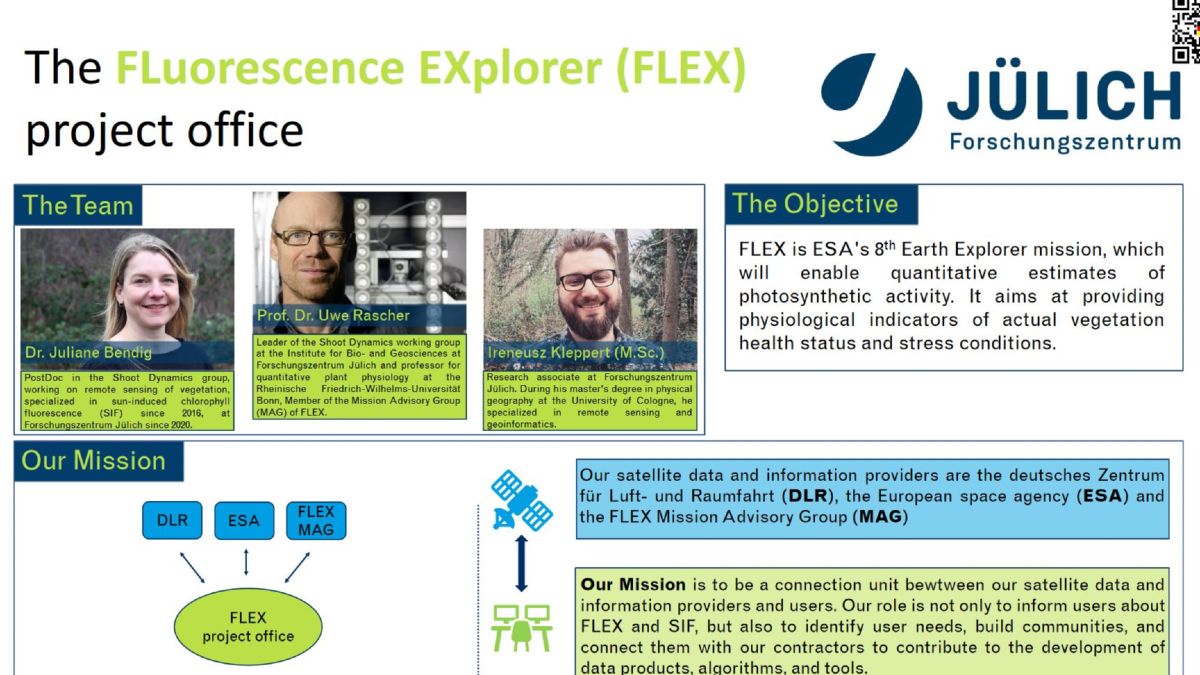Image: Andreas Burkart
Project
The FLuorescence EXplorer (FLEX) is the eighth 'Earth Explorer' mission, scheduled for launch in 2026. The FLEX mission uses the measurement of sun-induced fluorescence (SIF) to provide the current photosynthesis of our vegetation with a high temporal and spatial resolution globally.
The FLEX project office is managed by Forschungszentrum Jülich, in cooperation with the German Space Agency at DLR .
Our tasks are:
- to inform German scientists and companies about the possibilities of using the FLEX satellite data,
- to develop scientific and commercial usage concepts,
- and to provide a contact point for European and international synergistic activities.
We are pursuing the goal of building a German user community that can optimally use and apply FLEX data for their research purposes. We also want to make the potential of the FLEX satellite mission accessible to a broader public.
To implement these goals,
- we continuously evaluate German and European funding opportunities for users,
- advise interested parties on the application,
- discuss concepts for new data products,
- create a data usage concept,
- create a gap analysis of the FLEX mission requirement from the point of view of the German user community,
- and inform the public about the status of the FLEX mission.
Our work packages
- Elaboration of technological and scientific questions and fields of application that are particularly relevant for a German user community;
- Identification of support measures to facilitate demands in the interest of German industry and users;
- Communication of the German interests, goals and proposed support measures in the Mission Advisory Group (MAG) of ESA;
- Continuous information of our client and the German scientific and other user groups about the implementation and progress of the FLEX satellite mission;
- Involving scientific groups that are not directly related to fluorescence research but want to use FLEX data products in other projects;
- Informing the scientific user community about ESA calls and coordination/bundling of German applications;
- Contacts to national funding bodies and exploring funding opportunities for FLEX user groups;
- Conducting FLEX user workshops and FLEX user seminars, as well as providing the associated material.
- Analysis and structuring of the interests and competencies of German FLEX data users;
- Creation of a concept for using FLEX data in the field of climate and climate modeling and identifying measures to support the use of FLEX data;
- Inclusion of national user requirements in the definition of data products;
- Participation in the definition of (higher value) data products;
- Conceptualisation of measurement campaigns and Cal/Val work.
- Development of a gap analysis, in which existing gaps between data availability and user expectations are shown, specifically for a German FLEX user community;
- Identifying solutions to close the identified gaps.
- Establishment of the FLEX project office as a visible contact point for press and public for all relevant questions regarding the FLEX satellite mission;
- Expanding the acceptance, knowledge and use of the FLEX satellite mission in science and the general public.



